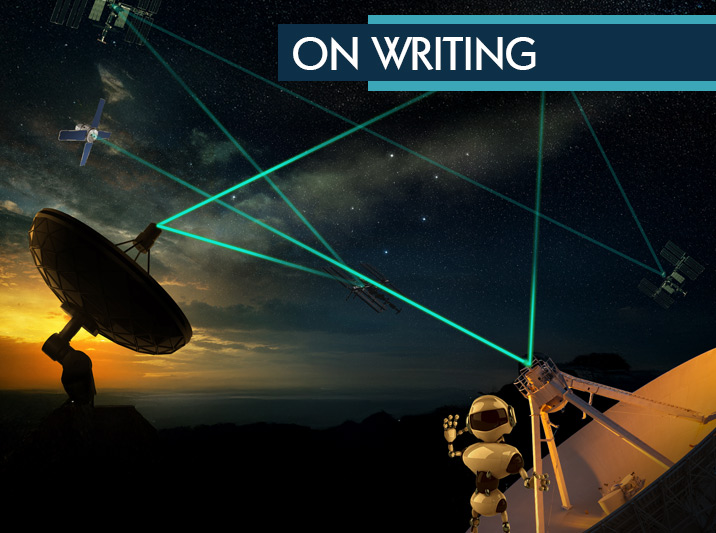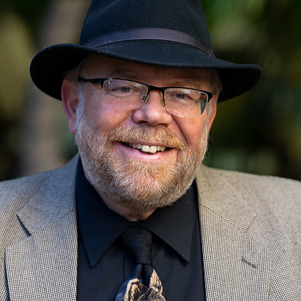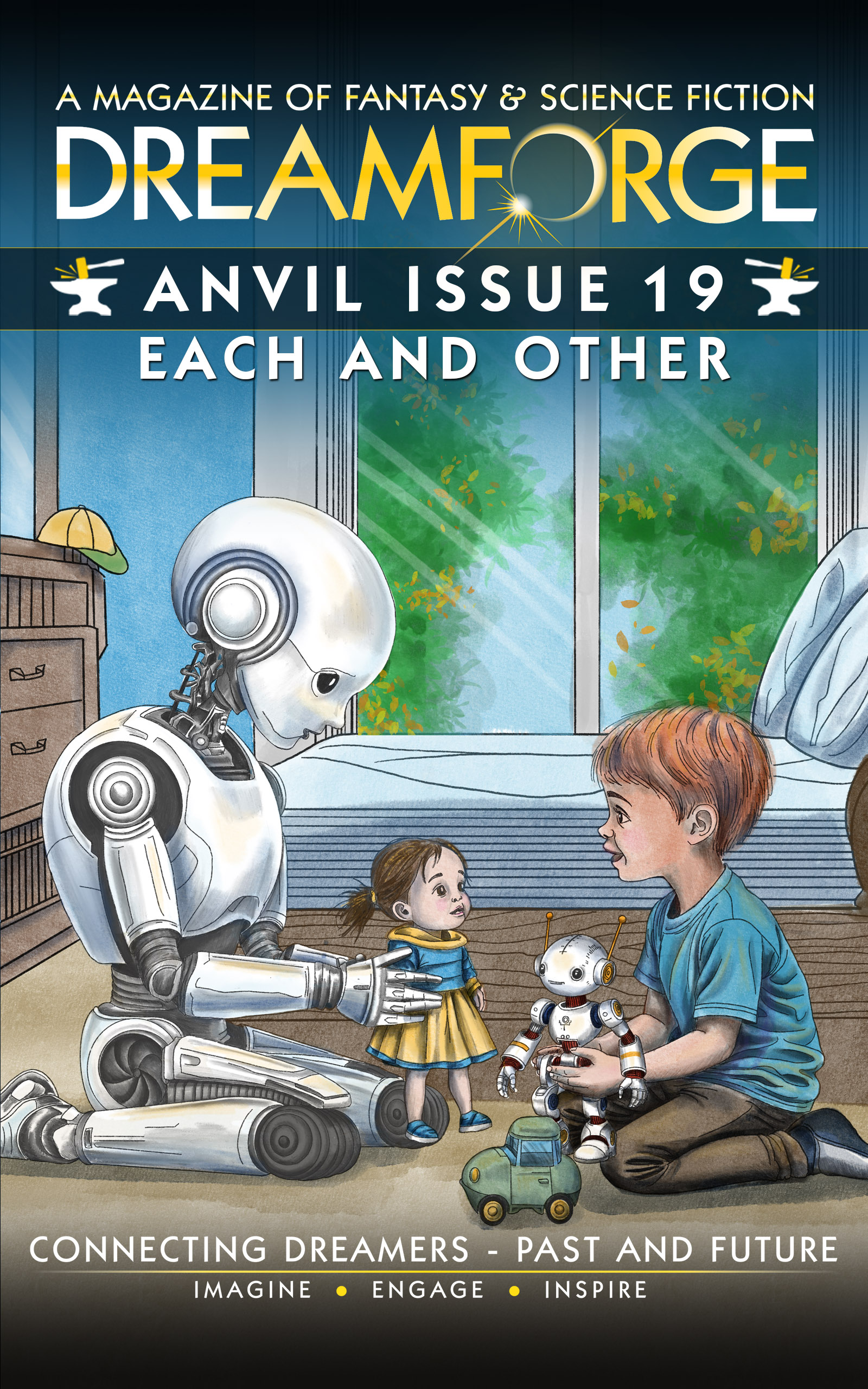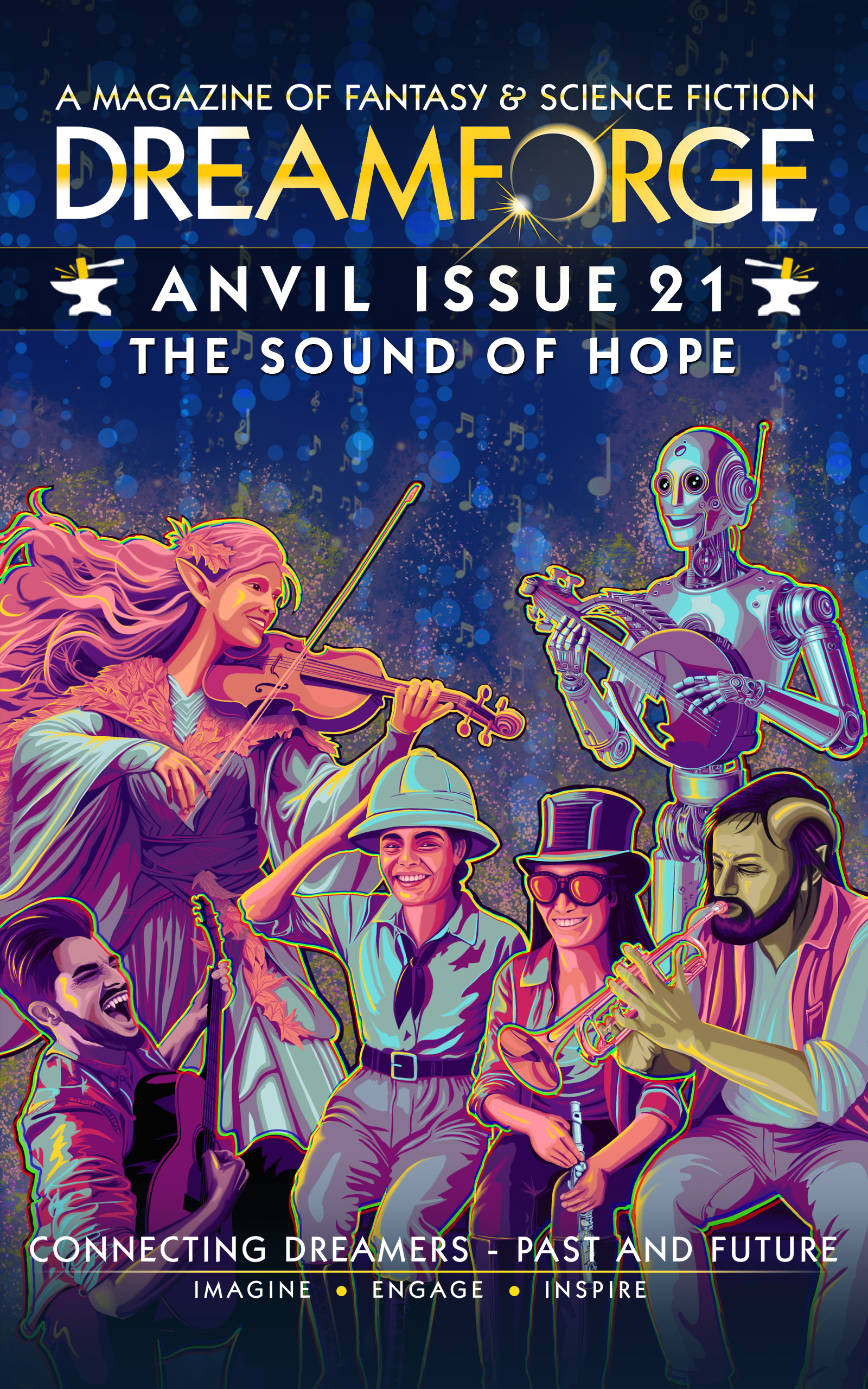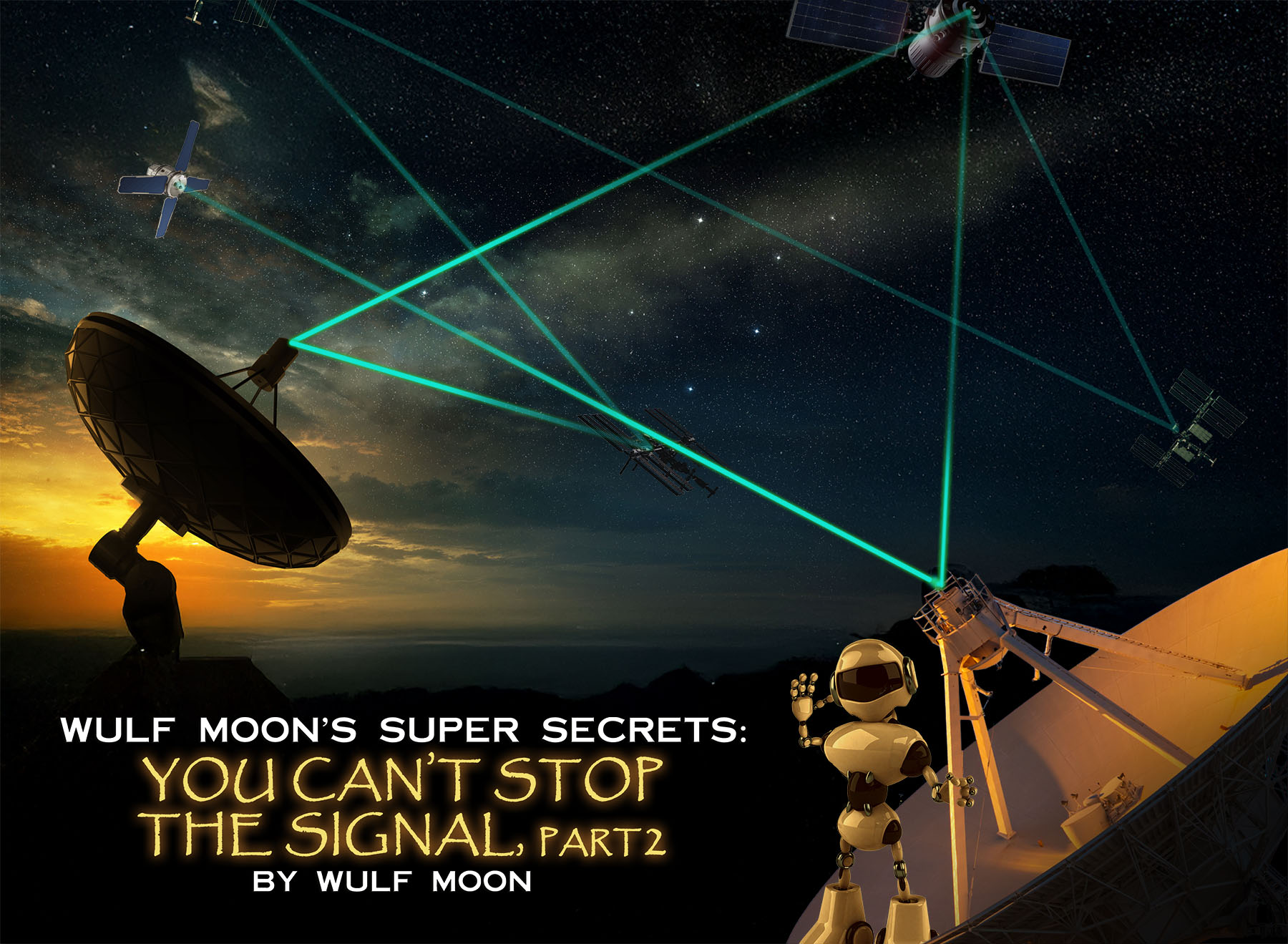
“I’m just a simple man trying to make my way in the universe.”
—Jango Fett, Attack of the Clones
In our last episode, we discussed the importance of writers creating their Public Relations Station. If we don’t have an easily accessible social media author platform and a way for fans, editors, and publishers to find us, it’s going to be tough to build a following. You can’t stop the signal, Mal. But if we’re not even broadcasting a signal, there’s no frequency for Opportunity to tune in its dial to find us.
When scruffy-looking nerf-herders tell you that you don’t need websites and newsletters and social media and —gasp— marketing and branding techniques, I’ll give you one piece of advice: Aim to misbehave.
Granted, if we’re still getting our footing in learning our craft and have yet to achieve a respectable sale, we could wonder, What’s the point, Moon? I haven’t sold anything yet and maybe I never will. Full stop! The point, my friend, is if you don’t plan for success by building a nice nest for it to land in, it’s going to fly right past you to that writer that made it a cozy nest with chocolates on the pillows and free breakfast and HBO. To achieve success, one must have the mindset that success is just about to land in your tree and you prepare for it to do so.
I’ve watched many emerging writers think they didn’t need to follow this advice. Suddenly, they level up and the floodgates open and hard-won publicity flows their way as they win a prestigious writing contest or get published in a respected publication. Alas, they have no system set up to start collecting e-mail addresses from readers that will become their current and future fan base. Their publisher will ask for their bio tout de suite to include with their story and the writer gets caught with their pants down. They know they should direct potential fans to their websites through their author bio, but they don’t even have a website to list!
Major opportunity … lost.
They might scramble to buy a domain name to build their Public Relations Station upon, but the best name they could use —the name they publish under— has already been claimed. They’ll either let opportunity pass, or they’ll jury rig a website in a mad scramble that looks like an EF5 twister ran through it. Many of these rushed sites have no method to collect e-mails from potential fans— they forgot they need a newsletter platform with a signup form, and they have no way to offer a reader magnet like a free story for e-mail capture. Others fail to plainly list their contact info (don’t list a personal address— use email or better yet, a contact form), and editors that seek the author with new publishing opportunities get frustrated rifling through the website and end up giving the opportunity to someone else.
Yes, this happens. But it doesn’t have to happen to you. Because forewarned is forearmed … if you act on the information. What’s that? You read Part One and you already acted on it. Excellent! I guess I’m preaching to the choir. Well then, let’s go to stage two! Even if you haven’t quite hit this level yet, you’ll be prepared to make it happen.
Stronger Amplifier, Wider Coverage
Once you have your Public Relations Station built and it’s broadcasting your signal, you can boost that signal with a stronger amplifier, reaching a wider audience. You can also build a higher tower, increasing your area of coverage. Let’s examine a few of the many methods a writer can develop to help them reach a regional, national, and yes, even a global audience.
Amplifying your signal. First and foremost is quality of product. If a writer is not focused on improving their craft, the material offered to the public will likely not meet professional standards. It’s like tuning in to a static-riddled radio station. You … might listen fo … few minu … but then it cuts … and the words crackle … Bienvenue à la radio québécoise … No, stay with me! Today’s progra … zfffftttt frickle fritzzzzz …
No amount of slick covers and blurbs from a writer’s friends will compensate for bad material within. Bad writing is as frustrating as a radio station cutting in and out. Quality product sells and brings customers back for more. Bad product might sell once, but if it leaves a bad taste in the consumer’s mouth, they won’t buy anything from you again. In fact, they may even feel defrauded. You’ll know. They’ll leave tough reviews warning others away. Reviews that can be extremely hard to shake off of your brand.
But you’re a serious student of writing, you’ve put in your time, and you deserve your dime. You’ll know. If you’re an indie writer, you’ll have hired professionals to help you make your novel the best that it can be. Readers won’t be put off by infodumps and boring plots and typos giving them the evil eye page-after-page. Instead, they’ll be mesmerized and leave you five-star reviews, ask when your next book is coming out, and they’ll tell all their friends to go read your beautiful stories. That’s the best kind of signal you can get!
If you seek traditional publication, you’ll start getting nice personal rejections and requests to send more. And then you’ll sell to respected publications and because they’re able to pay you a decent rate, it will mean they have subscribing followers. Readers. Fans. People that will sample your work, realize you’re the real deal, and will tune in their dial to your Public Relations Station, hoping to get more of your quality productions.
Because you’re broadcasting and offering meaningful content, they’ll stick around.
Writing Contests
Here’s a way to amplify your signal: winning respected writing contests. With four million titles released each year —the majority published by independent writers— how do you get your works to rise above the masses clamoring for attention and get yourself recognized?
Answer? Win a respected writing contest. Being able to add “award-winning writer” to your brand? Especially if it’s a prestigious writing contest readers and editors know is synonymous with quality? A big win stamps your abilities and product as bona fide. Recognized industry professionals have given you an award, which stamps you and your work as the real deal. With every writer saying they’re the real deal and now having the ability to put anything they write (or that AI has written for them) online for sale, displaying an award by a respected writing contest will make your work stand out. Multiple awards? Even better! When you tell readers you’re a good writer and that they can trust the quality your work, they’re going to think, Of course she would say that. She’s trying to sell me something! But displaying or stating that you won an award from a respected authority that’s known for discovering the best? That’s a horse of a different color! Let me see what you’ve written!
These respected contests help your win stand out for a number of reasons. They often have thousands of entries in each contest period and have no interest in fleecing writers— in fact, the best don’t charge entry fees. Submissions are blind, meaning entrants’ names are removed from manuscripts to ensure entries are judged solely on their merit. The best enlist judges of highest caliber, bestselling writers and editors that have a sterling history in the publishing industry and know great writing when they see it— they’ve written or published great writing themselves!
Here’s just a few writing contests that don’t charge entry fees that will certainly amplify your signal if you win (plus pay you good money for your story):
- Story Unlikely Short Story Contest. https://www.storyunlikely.com/#contest
- The Mike Resnick Memorial Award. https://www.arcmanorbooks.com/resnick
- Baen Fantasy Adventure Award. https://www.baen.com/contest-faa
- Jim Baen Memorial Short Story Award. https://www.baen.com/contest-jbmssa
- Writers and Illustrators of the Future. https://writersofthefuture.com/enter-writer-contest/
Win any of these —like Writers of the Future that has thousands of entries from around the world each quarter— and you and your work will be recognized as highest caliber to have beaten such challenging odds. Your work will get a huge signal boost from these contests that have their own Public Relations Stations. People in the industry will take note. So will readers. As Captain Mal said in Firefly: “We’ve done the impossible, and that makes us mighty.”
In fact, at Writers of the Future, you’ll get a publicity team that will follow and promote your successes for the rest of your career. Ask myself or editor Scot Noel at DreamForge how we know. Better yet, go listen to some of the Writers of the Future Podcast episodes where they’ve interviewed us years after we won the contest. Here’s Scot’s latest, Episode 314— https://writersofthefuture.com/podcast/episode-314. Here’s my latest at The Author’s Quill— https://rumble.com/v5x2s2k-the-authors-quill-guest-writer-wulf-moon-second-hour-publisher-mark-leslie-.html. Talk about signal boost! These programs currently have over two million global live listens per episode.
That’s truly from here to the eyes and the ears of the ‘Verse!
Conventions and Seminars
Would you like to attend a science fiction convention, a comic con, or a writing seminar? You will be surrounded by people that have similar interests to your own. What’s more, these like-minded people will have the opportunity to see you, to get to know you, and some will ask you what you do and what you’re working on. Tell them! Show them! These are your people and chances are they have a need for your product, they just don’t know it yet. Hang out at the convention hotel’s bar at the end of the day and strike up conversations. I’ve always found the best information and the best things happen outside the conference rooms. Or, if you’re sitting at a table, don’t be afraid to set your book out. People are curious. Give them the opportunity to see your work. They might just ask if they can take a look and buy a copy.
That’s low wattage power output, but it’s a start. Higher wattage will boost your signal at cons, such as applying to be a panelist. If you’re accepted, you’ll likely be on multiple panels with lots of people in the conference room, increasing your range as a writer and your street cred as an expert on the subject you’re speaking on. After all, the audience knows the speakers get vetted, so you are now bona fide by being a speaker at a con! And a good moderator will always ask at the end of a panel how the audience can find your work. Tada! You have an established Public Relations Station. Give the audience your call sign!
How do you become a guest at larger conventions which will give you even higher wattage? Start small and work your way up. When you apply to be a speaker, the application often asks where you’ve been a panelist or guest before. Being able to list a convention or seminar you’ve spoken at gives you credibility, and a way for the convention’s programming committee to check up on how you handled yourself. Your great reputation in dealing respectfully with others can open many doors. So does your growing successes in the field you write in. It’s all cumulative, helping you step up to the next level.
That next level is becoming a Special Guest or Guest of Honor or Featured Guest or even a convention’s Keynote Speaker. There is obvious signal boost in being a higher level guest— not only do you get bigger conference rooms with larger audiences and are featured up front in the program book and website, a vendor in the bookroom will often order the special guests’ books to sell to attendees. If people like how you represent yourself on presentations and panels —trust me on this! — they will seek out your books in the bookroom. One of the reasons fans attend cons is to discover new authors. When you’re a featured author, it’s super easy for them to see you as their next discovery. You’ve already been vetted by the convention they love to attend.
There’s another benefit to becoming a speaker at seminars and conventions. At the entry level such as an accepted panelist, you normally get your registration fee covered. At the Special Guest level, you might get some financial support, like your room covered, perhaps even a small honorarium to help with expenses. At Featured Guest level, you’re a VIP invited to speak by the con committee, so you’ll likely have most of your expenses covered, perhaps even your airfare. And if you’re the Keynote Speaker, you’re the convention’s highest level VIP guest. They’ll be rolling out the red carpet for you: airfare, airport pickup, a nice room, all meals, an honorarium, and perhaps even a thoughtful gift to thank you for your time. You’ll be speaking in the auditorium addressing the entire crowd, not just in the smaller conference rooms. Huge megawatt signal boost!
Just remember —start small, be helpful, treat your fellow panelists with respect, don’t dominate the panel and act like a pompous know-it-all, don’t be a Prima donna— and con committees will take note. They’ll also recommend you to others. YOU are your brand, and nowhere is this more important and more evident than at cons. Develop your brand look. Dress for success. But most of all, treat people respectfully. Which we all should be doing everyday anyhow. Practice kindness every day to everyone you meet, and it won’t be an act when you’re speaking at a convention and meeting your starry-eyed fans. Make it a joy for fans to meet you at last. They have been waiting for this moment for a long time. Your kind attention will mean the world to them.
As the famous motivational speaker Zig Ziglar said: “You can have everything in life you want, if you will just help enough other people get what they want.”
A word of warning. Don’t be a hustler. Not in any of your branding or marketing. No one likes being hustled. Be a giver of value. Be an enhancer and enricher of people’s lives around you … and those people will likely enrich yours as well.
Direct Sales
There is no substitute in sales for being the creator of a product and sharing your passion for it with consumers face-to-face. It’s sincere, it’s infectious, and if the consumer likes how you present yourself, they’ll want to hear more if they believe what you’re offering might be of value to them. After all, isn’t this why we go to conventions and walk the sales floor with all those booths broadcasting, “Hey look! Shiny! Come check out my stuff!”
Granted, the bigger the convention, the bigger the price tag to book a table or a booth space to make direct contact with consumers. And not all conventions attract a good body of people that read in the genre you write in. Then there’s the display— the backdrop that tells passersby what you do and why they should stop and check your space and products out. There’s hotel and travel expenses that must be factored in. And how much product you should have on hand— many a fledgling entrepreneur has been bankrupted by producing more product than they need. In convention direct sales, there is the real risk of shelling out a lot of money for very little return.
Still, I can attest from decades of selling a variety of products through my companies —including books— that there is no better way to create an emotional experience with a consumer than standing before them, looking them in the eye, and sharing your belief and passion for the product you have created. People have radar up and recognize hustlers when they meet them. But a sincere creative that has put their heart and soul into their creation and truly feels it will benefit others? People read sincerity. If it’s radiating off of you, it’s going to radiate into them. If you’re offering books that fit their needs and you’re not hustling but sharing your common love of quality stories, your words will likely resonate. You can sell a lot of books to an audience that is already prequalified by the type of convention you’ve chosen to sell at. Ask your friends who have been doing direct sales at conventions. They’ll tell you where the good ones are.
It doesn’t have to be ‘Go big or go home.’ Start small. Many have experienced remarkable success selling their books at local farmers’ markets and fairs, and it doesn’t take a downpayment of their firstborn to secure a spot. Local writing groups may have regular public readings and allow you to sell your books when you’re the guest reader. And you can always talk to bookstores about doing a signing event for your book, even if you’re indie published. Bookstore owners love books and promoting local authors.
Finally, you can do direct sales through your website, selling both digital and print copies of your work. You don’t even need to stock inventory— you can dropship direct to the customer through print-on-demand publishers. Setting up your digital store requires a bit of tech savvy, and of course a variety of products to offer a selection to make the investment worthwhile. I recommend you start your digital sales journey with Damon Courtney at BookFunnel. He’s a writer like us that recognized the needs for today’s authors and built a company to provide solid solutions. He’s also a friend and one of the nicest people you will ever meet. And no, he doesn’t know I’m recommending his company to you. Do yourself a favor. Check it out. https://bookfunnel.com/
Paid Advertising
Hall of Fame advertiser Phil Dusenberry said: “I have always believed that writing advertisements is the second most profitable form of writing. The first, of course, is ransom notes.”
Funny. Of course, writing an advertisement is only profitable if it’s effective and moves consumers to see the need for your product in their lives, which ultimately leads them to buy your product. If your ad campaign is simply “Buy my book! Buy my book! Buy my book!” you’re going to turn a lot of people off.
Like everyone.
But here’s the rub. In advertising, there’s something called The Rule of Seven. The theory is it takes a consumer seeing your ad (called an impression) seven times before they actually recognize it and can choose to act on it. This theory of seven impressions has never been scientifically proven, but the principle of this theory is correct. We are busy people. We also have mental shields up to help us hold on to our money. It takes repeated impact against those shields to break down resistance, establish credibility, create an emotional need, and move someone to see the value of our product and finally recognize their need for our product.
This means that multiple impressions from a variety of angles are necessary before a person can recognize our creative work might actually exist, be a good fit for them, and worth the money (and time) necessary to purchase the product and consume it. In other words, we have to find ways to keep asking people to “Buy my book” to get in those repeated impressions without sounding like we’re shouting “Buy my book! Buy my book! Buy my book!” Tricky!
This is why a certain insurance company keeps showing you a variety of scenes centered around a charming gecko with a British accent, and then a gentrified caveman surfaces from time to time, and then it’s back to the gecko touring the country. Same company transmitting to you multiple impressions from different angles and settings all subtly saying the same thing: “Buy my insurance! Buy my insurance! Buy my insurance!” But they change it up so the barrage of ads don’t sound like that. Lots of variety, lots of entertainment, lots of funny vignettes, every one of them impressions trying to get past your shields without irritating you so that you might finally get curious, check their product out, see their advantages, and make the switch.
Granted, we’re not insurance salespeople. But the principle is the same. Multiple impressions from different angles, all leading your potential costumer to finally arrive at that crux where they recognize you might have something of value to them, and finally, should they risk their money to buy it.
How do we send our signal in their direction so multiple impressions can be made?
There’s no way I can cover all the methods and places you can advertise. But if you’re selling your books on Amazon’s Kindle platform, Dave Chesson is a great guy to start with. He’s called the Kindlepreneur for a reason. I’ll venture that nobody knows how Kindle’s sales algorithm works better than Dave Chesson, not even Amazon. Yes, Dave’s a friend. No, he’s not paying me to say this. He’s got all the tools and videos to help you get started. Lots of free stuff as well. You can check him out and how to run Amazon ads at: https://kindlepreneur.com/
Another way to make those impressions is with Facebook ads. You will need a Facebook business account, but the account is free. It’s relatively easy to make a post, then hit the Boost button that comes up when you push Share, which will take you into their advertising dashboard. You pay according to the duration of the ad and the number of people you want to reach. Signal! Start small, say six bucks a day, and test an ad for a week or more. Watch not only for how many impressions you get but how many clicks the ad generates. Clicks are people clicking on the hyperlink button that takes them to your landing page or website where they can find out more … like how to buy your book!
There you go. That’s a start. If you want a deep dive, there are many courses you can take online on how to create ads and how to run your campaign. Or you can listen to some of the best in the independent publishing business by attending the Superstars Writing Seminar (https://www.superstarswriting.com/ ) or the Author Nation convention held in Las Vegas every year. https://www.authornation.live/
Podcasts
I’ll make this simple, even though I’m venturing into turbulent waters. Popular podcasts now provide tremendous signal range. So much so, some say podcasts helped secure the latest presidential election. It’s not hard to understand. The podcast creators have a built-in audience —some in the millions— and they need content targeted to their listeners’ interests to keep and grow their audience. Some have massive Public Relations Stations and they are broadcasting big time, not only in this country, but around the world.
You’re an author with a book or books. The author, writing, and publishing podcasts need content. Send them an email asking if you can come on their program. You’ll be surprised how many authors are not only getting on these popular programs, they’re finding new audiences. Some savvy authors have even created their own podcasts to boost their signal while sharing valuable information and interviewing industry professionals. People are listening. And it doesn’t have to be a huge audience to produce results. I’ve been interviewed on podcasts with millions of listeners, but also on one that only had forty. That little podcast interview actually ended up making me hundreds of dollars, all while I shared my love of writing and my story about why I enjoy helping emerging writers to succeed.
That’s what you call a win-win.
So here we are, on the raggedy edge. I’m just a simple Homo sapiens trying to make my way in the ‘Verse. So are you. You may not need all of this advice yet, but if you keep writing and mastering your craft, you will. And if you’re planning for success and doing the work, it will likely happen sooner than you think. Be prepared! Build your Public Relations Station, even if it’s one simple brick at a time. Aim your satellite dish toward the sky, boost that signal, and say to the ‘Verse: “You can’t take the stars from me.”
Shiny!


